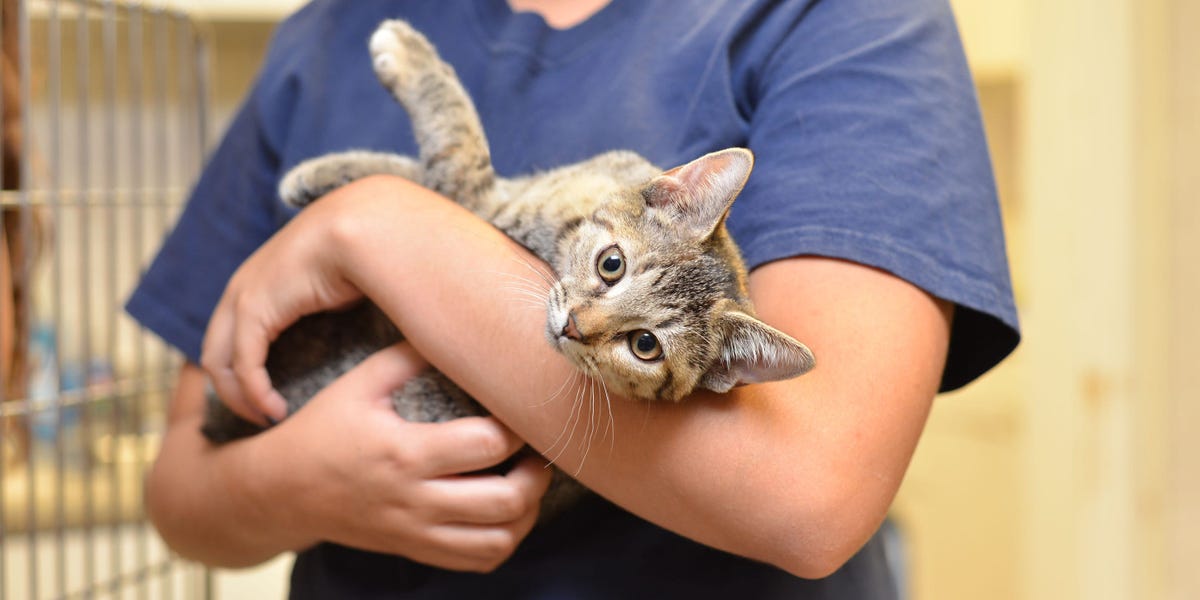- January 24, 2023
- No Comment
- 5 minutes read
Animal shelters say they're 'beyond capacity' due to soaring inflation – Business Insider

Many animal shelters across the US are “filled to capacity or beyond” according to Best Friends Animal Society.
Amid surging inflation and rising economic anxiety, more pets are being given up and adoptions are “lagging way behind,” it said.
The Casper Humane Society in Wyoming told Insider it felt forced to close the list of animals waiting for a place after it became “too overwhelming.”
The shelter, which takes in both pets and stray animals, generally looks after around 100 animals at any given time — including about 60 cats and 40 dogs as well as other “assorted small critters” like rodents and reptiles.
Craig Cummings, director of the Casper Humane Society, said his team has noticed a bump in the number of pets being abandoned. He said it has been forced to operate above capacity all year, and there are over 100 dogs and at least 200 of cats waiting for a safe home.
“We receive calls on a daily basis from owners that can no longer afford to keep their animals, and people who are being displaced from their housing,” he said.
Surging prices and widespread housing insecurity are putting pet owners in a tricky situation.
According to estimates from the ASPCA, it costs $1,391 annually to own a dog, and $1,149 to own a cat — and soaring inflation has made pet care even pricier.
Shelters, facing their own surging costs, are struggling to pick up the pieces.
Cummings spoke to Insider in early November when it was 26 degrees Fahrenheit (–3 degrees Celsius) outside and snowing in its base in Wyoming.
Cummings said: “The animals currently in our shelter are fortunate. They have a safe and warm place to stay — and they have people that care about spending time with them even when the weather’s not the best.”
He worries about what will happen to pets when shelters are full: “Owners feel helpless when all the shelters are full and there are no resources for them. They often resort to rehoming on social media, which can be dangerous, or abandoning their animals with hopes that they will survive and find a new family.”
“Now that winter has arrived in Wyoming, the chances of pets surviving outside alone is minimal.”
Shelters’ struggles aren’t just about space. Soaring prices are stretching their limited funds.
The Cat House on the Kings, a no-kill shelter in Parlier, California, is currently grappling with both declining donations and declining adoptions.
Tammy Barker, the shelter’s assistant director, told Insider: “When the economy is struggling and people are unsure of their financial stability, they don’t donate to nonprofits like The Cat House on the Kings.”
The shelter has rescued 1260 cats and kittens so far this year, but it’s worried about the future. Barker said: “We’re not sure how long we can continue if donations don’t pick up.”
In the face of a likely recession in 2023, the outlook is bleak. “We will have to turn away animals that depend on us for survival,” said Barker.
Pet owners who are struggling financially could check if nearby offer support to help them keep their pets at home.
Julie Castle, chief executive officer of Best Friends Animal Society, said some shelters have started to provide “pet food pantries” to give out food.
“The pandemic kickstarted a wave of these donation-based pantries, finding a silver lining in an otherwise tumultuous time,” she said. “Sometimes a bag of pet food makes all the difference between keeping a dog or cat in its home, or someone having to make the agonizing decision to surrender their pet to a shelter.”
Check out: Personal Finance Insider’s tips for pet insurance
Read next

